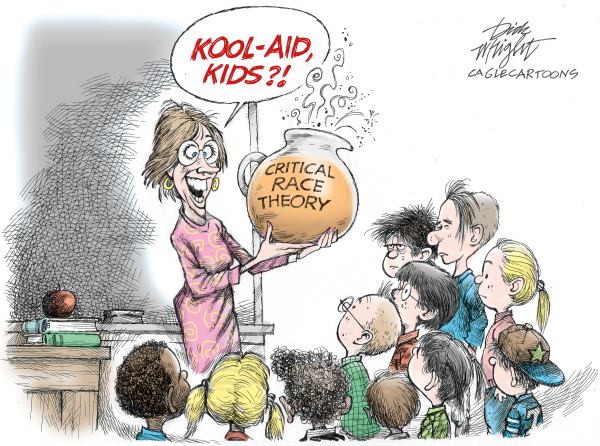
The threshold question, itself the subject of rancorous and oftentimes disingenuous debate, is what the term "critical race theory" even refers to. When this semantic debate surfaces, proponents usually attempt two things at once.
First, they accuse their CRT-skeptical interlocutors of being bigots, white supremacists or apologists who want to deliberately muddle and whitewash America's complex — and at times tragic — history of race relations. This first step involves CRT proponents grilling CRT critics as to why they are so "scared" to "discuss racism" or "discuss slavery," as if that applied to anyone other than a truly infinitesimal and politically powerless fringe subset.
Second, while publicly seizing the moral high ground, CRT proponents simultaneously work behind the scenes to advance what it is that they actually believe. Consider this forthright (and harrowing) admission from "Critical Race Theory: An Introduction," a 2001 book from Richard Delgado and Jean Stefancic: "Unlike traditional civil rights, which embraces incrementalism and step-by-step progress, critical race theory questions the very foundations of the liberal order, including equality theory, legal reasoning, Enlightenment rationalism and neutral principles of constitutional law."
CRT proponents, in line with the "anti-racism" movement and vogue notions of "equity," candidly advocate for discrimination — as long as it is anti-white, anti-Asian, anti-Christian or anti-Jewish. As leading CRT "anti-racist" intellectual Ibram X. Kendi wrote in 2019's "How to Be an Antiracist": "The only remedy to racist discrimination is anti-racist discrimination. The only remedy to past discrimination is present discrimination. The only remedy to present discrimination is future discrimination."
In practice, as courageous investigative journalists such as the Manhattan Institute's Chris Rufo have laid bare for all to see, CRT takes the form of crass racial indoctrination that ascribes collective and historical guilt to white Americans, urging white parents of schoolchildren to seek "white abolition" and accusing schools of wantonly "spirit murdering" black children. The two-step CRT apologia described is thus willfully dishonest. It is a bad-faith argument, pure and simple. In formal logic, we would recognize it as a prototypical motte-and-bailey fallacy.
It is, furthermore, a logical fallacy committed to advancing profoundly un-American notions of collectivized and racially hierarchical guilt and innocence. This weekend, as we recall the most famous exhortation in the Declaration of Independence, "that all men are created equal," we should consider just how antithetical CRT is to that most foundational American principle. That principle of real, genuine human equality, subsequently woven into our legal and social fabric via the 14th Amendment and the Civil Rights Act of 1964, sits in an irreconcilable state of tension with the crass and overt anti-white bigotry embodied by CRT.
CRT in most forms is already illegal under Title VI of the Civil Rights Act, but many Republican-governed states have gone further, crafting and passing new legislation to specifically ban CRT pedagogy from corrupting their impressionable youth.
While every piece of legislation or regulatory rule is distinct and must be legally assessed on its own merits, these states are absolutely correct to ban CRT indoctrination against the protestations of both left-liberal and right-liberal critics.
Many arguing against the states' CRT bans resort to trite First Amendment appeals. "You're infringing on teachers' speech!" they risibly claim. Nonsense. A public school classroom is not a utopian "marketplace of ideas" derived from an Enlightenment-era political pamphlet.
On the contrary, states in our constitutional order retain near-plenary power to craft their educational curricula. If the First Amendment-appealing crowd were intellectually consistent, they would similarly object to a state education bureaucracy banning the teaching of Holocaust denial. And if the secular leftists among this cohort were consistent, they would presumably object to a state's ban on teaching the Book of Genesis' creation story. They won't.
More generally, any society that takes the bare minimum amount of pride required to wish to sustain itself for its progeny must understand that instilling racially divisive poison in the minds of impressionable students is a recipe for disaster. No nation will long endure if its youngest generation is full of disdain, disgust and self-hatred. The traditional goal of education, as the Founders conceived it, was to help inculcate the sound republican habits of mind and civic virtues necessary for a flourishing polity.
Suffice it to say we have deviated far from that, but surely we can at least ban pedagogies that are often outright deceitful — such as The New York Times' much-criticized "1619 Project" — and are always dedicated to collective self-immolation.
Banning CRT is neither coercive nor liberty-infringing. Rather, it is a prudent and necessary first step to salvaging a fractious nation teetering on the brink of collapse.
(COMMENT, BELOW)


 Contact The Editor
Contact The Editor
 Articles By This Author
Articles By This Author